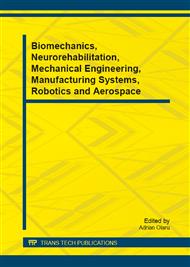[1]
J. Zongxia, L. Chenggong, and R. Zhiting, The extraneous torque and compensation control on the electrical load simulator, 5th International symposium on Instrumentation and control technology, Proc. SPIE 5253, 723 (2003).
DOI: 10.1117/12.521962
Google Scholar
[2]
Xingjian Wang, Shaoping Wang and Bin Yao, Adaptive Robust Control of Linear Electrical Loading Simulator with dynamic friction compensation, IEEE/ASME International conference on advance intelligence and Mechatronics , pp.908-913,July 6-9, (2010)
DOI: 10.1109/aim.2010.5695781
Google Scholar
[3]
B.S. Kim and S.I. Han, Non-linear friction compensation using Backstepping control and robust friction state observer with recurrent fuzzy neural networks, Proceedings of the Institution of Mechanical Engineers, Part I: Journal of Systems and Control Engineering, vol. 223 no. 7, pp.973-988, November 1, 2009.
DOI: 10.1243/09596518jsce737
Google Scholar
[4]
Nasim-U, Shaoping-Wang and Aslam-Jawad, Adaptive Robust Control of Electrical Load Simulator based on fuzzy logic compensation, International conference of Fluid Power and Mechatronics (FPM), pp.861-867, 17 - 20 August 2011, Beijing China
DOI: 10.1109/fpm.2011.6045882
Google Scholar
[5]
X .Wang, S .Wang , and X. Wang, Electrical load simulator based on Velocity loop compensation and improved fuzzy PID, IEEE International symposium on industrial electronics (ISIE ) , pp.238-243 ,Olympic parktel ,Seoul, Korea , July 5-8 ,2009.
DOI: 10.1109/isie.2009.5213288
Google Scholar
[6]
Q. Fang, Y. Yao, and X.C. Wang, Disturbance observer design for Electric aerodynamics load simulator, Proceedings of 4th International Conference on machine learning and cybernets, pp.1316-1321, Guangzhou, August 18-21, (2005)
DOI: 10.1109/icmlc.2005.1527147
Google Scholar
[7]
R. Yuan, J. Luo, Z. Wu, and K. Zhao ,Study on Passive Torque Servo System Based on H Infinity Robust Controller, Proceedings of the 2006 IEEE International Conference on robotics and biometrics, pp.369-373, December 17- 20, 2006, Kunming, China.
DOI: 10.1109/robio.2006.340204
Google Scholar
[8]
J. Fan, Z. Zheng, and M. Lv, Optimal sliding mode variable structure Control for Load simulator, 2nd International Symposium on systems and control in aerospace and aeronautics (ISSCAA), pp.1-4, December 10-12, 2008.
DOI: 10.1109/isscaa.2008.4776244
Google Scholar
[9]
X. Wang, and D. Feng, A Study on Dynamics of Electric Load Simulator using spring beam and feed forward Control technique, Chinese control and decision conference(CCDC), pp.301-19 June 2009.
DOI: 10.1109/ccdc.2009.5195100
Google Scholar
[10]
Y. Huang, K. Chen, and J. Wei, Robust Controller Design and Experiment for Electric Load Simulator, 3rd International Conference on advance computer theory and engineering (lCACTE), pp.236-240, 20-22 August, 2010.
DOI: 10.1109/icacte.2010.5579642
Google Scholar
[11]
X. Wang and S. Wang, High performance torque controller design for electric load simulator system, 6th IEEE conference on industrial electronics and applications(ICIEA), pp.2499-2505, 21 -23 June , 2011.
DOI: 10.1109/iciea.2011.5976013
Google Scholar
[12]
S. Liu, M. Wang, K. Tian and Y. Wang, Research on loading simulation of DC torque motor for electrical load simulator, IEEE conference on industrial electronics and applications (ICIEA), pp.1146-1150 , 3-5 June ,2008.
DOI: 10.1109/iciea.2008.4582698
Google Scholar
[13]
X. Wang, D. Feng, and S. Sun, Electric load motion control system Design with invariance theory, IEEE Chinese decision and control conference (CCDC), pp.253-257, 17-19 June, (2009)
DOI: 10.1109/ccdc.2009.5195091
Google Scholar
[14]
Nasim-Ullah and Shaoping-Wang, Improved torque control of electrical load simulator with parameter and state, World Academy of Science Engineering and Technology(WASET), Vol. 60, No. 302, pp.1684-1690, December (2011)
Google Scholar
[15]
C. Y. Chen, and M. Y. Cheng, Adaptive disturbance compensation and load torque estimation for speed control of a servomechanism, International Journal of Machine Tools & Manufacture, pp.6-15, April 2012.
DOI: 10.1016/j.ijmachtools.2012.03.006
Google Scholar


